Tag Archive for 'fishing'
The humble sea cucumber is under increasing threat worldwide, a new report warns.
- Sea cucumbers: a global review of fisheries and trade - UN FAO report
- UN FAO
Increasing demand for the cucumber – once a cheap and staple food of the poor, but now fashionable in expensive restaurants – is piling pressure on already depleted stocks.
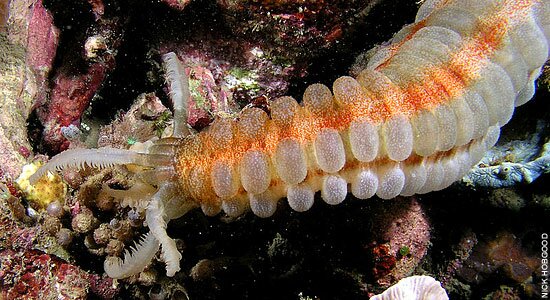
Sea cucumber feeding at night off the Indonesian coast
The UN’s Food and Agriculture Organisation (FAO) warns in its report that sea cucumber populations across the globe, from Asia to the Galapagos, are in trouble and most high value commercial species are already depleted.
In a majority of countries looked at by the FAO and in the African and Indian Ocean regions, stocks are overfished. Similarly, in the Asian Pacific region the most sought-after species are largely depleted. Continue reading ‘UN report: Sea cucumbers face overfishing threat’

What were thought of as certainties can fall apart in the light of new circumstances, new thinking.
For years we have been told that the Omega 3 fatty acids from oily fish such as salmon, tuna and mackerel are good for the heart and brain.
Now, some of the people who proved that the world’s fish catches were not rising but falling - a critical milestone in this century’s thinking - have produced a report that shows that the evidence for the beneficial effects of Omega 3s is somewhat less impressive than one might think.
The study actively challenges dietary advice that we actually should be eating more oily fish.
It says that people in the Northern hemisphere who eat a balanced diet may be getting enough Omega 3s anyway but people in the Southern hemisphere are having their essential proteins and fish oils stolen from them by diet faddism in the North.
Oily fish can actually be bad for overweight or unhealthy people with heart problems, it says.
Was the fad for Omega 3s perhaps just a marketing strategy worked up by the fishing industry? That’s going too far, but it certainly looks as this dietary obsession is something we should be looking at a whole lot more critically now we know that wild fish stocks are in trouble almost everywhere.
Policies can be skewed by vested interests - including our own perceived health interests.
In fact what the human race needs are balanced policies that promote healthy people and healthy wild fish populations, able to feed a human population that will rise by a third over the next half century.
That is what we should be planning for, together with ways of producing Omega 3 fatty acids from vegetables and algae, to take the pressure off fish.
In the meantime, we may actually need to eat less of certain fish - salmon and tuna for instance - rather than more as the dieticians have been calling for.

Scientists have published the first study that casts doubt on some of the health benefits of fish oils - and say that daily doses may actually increase the risk for people already suffering heart disease.
- Are dietary recommendations for the use of fish oils sustainable? - study from Canadian Medical Association Journal
- Charles Clover: Omega 3 from oily fish health benefits - the totem wobbles
-
Omega 3 fatty acids contained in oily fish such as salmon and tuna have long been hailed a “super food” which plays a key role in boosting our immune system, staving off heart attacks and cancer as well as increasing brain power.
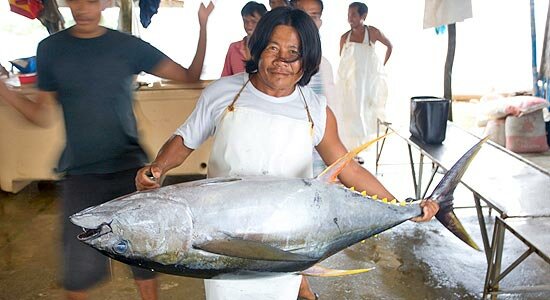
Tuna are rich in Omega 3 fatty acids, but are also under threat from overfishing
But the latest study finds little evidence to support the more extravagant claims and experts discovered that angina sufferers may put themselves at higher risk by taking fish oils.
The authors say that people in developed countries already have access to plenty of Omega 3 fatty acids in their diet, while people in poor countries were being deprived of essential oils and proteins by foreign fishing fleets. Continue reading ‘Omega 3 in oily fish may increase heart disease risk, study finds’

Most deep sea fisheries are unsustainable and should be closed, a new report says.
The call comes after a 25-year-long marine study revealed that commercial fishing in the north-east Atlantic could be damaging species at much greater depths than previously believed.
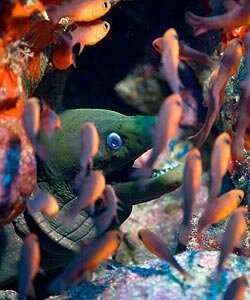
Moray eel - the study found numbers of one species of eel were down by half
Numbers of deep-water species living a kilometre below the reach of trawlers are apparently being affected by fishing practices, the new study found.
Although scientists have known that commercial fishing does affect deep-water fish populations they have now discovered it is occuring at much greater depths.
Populations of north-east Atlantic commercial deep-water fish such as black scabbardfish, orange roughy and roundnose grenadier have dwindled since deep-water fishing started in the area in the late 1980s but a quota system wasn’t introduced until 2003.
Dr David Bailey of the University of Glasgow, who led the study, published in the journal Proceedings of the Royal Society B, said:
“Commercial fishing may have wider effects than anyone previously thought, affecting fish which we assumed were safely beyond the range of fishing boats. We were extremely surprised by this result and believe that it has important implications for how we manage the oceans.”
Deep-water fish living off the west coast of Ireland were monitored by Natural Environment Research Council-owned ships from 1977 until 1989 before any fishery was operating in the region.
Researchers checked the same area again from 1997 until 2002 using exactly the same methods and the results were then compared as part of an EU-led project to study deep-sea species. Continue reading ‘Deep sea fish suffer far greater damage than was first thought’

EU: sharks now need protection from overfishing from The Times
It could spell the end of rock salmon or huss being sold at the chip shop. The European Commission, presenting its first plan to limit all types of shark fishing, has said that it had to act to stop several types of shark being pushed towards extinction. Read more . . .
‘Google Ocean’ launched as extension of Google Earth to map the seabed from The Telegraph
Google Ocean, which will be included in the newest version of Google Earth, will allow users to swim around underwater volcanoes, watch videos about exotic marine life, read about nearby shipwrecks, contribute photos and watch unseen footage of historic ocean expeditions - all from the comfort of their homes. Read more . . .

I am a sea angler. I am in this film – fishing for bass on the Blackwater estuary in Essex – and took part in it because I share the view that modern fishing technology in the hands of a few people is destroying the value of the sea for millions of citizens.
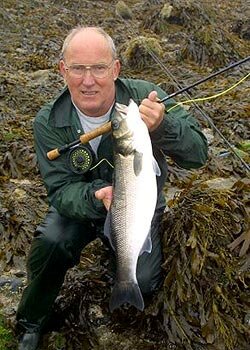
Bob Cox with a bass he caught
That is how it is in Europe, anyway.
In England, we fondly talk about the USA as being just the other side of the pond but as far as fisheries management is concerned, it may as well be the other side of the galaxy.
In the USA, recreational sea angling is recognised as a legitimate use of many species of fin fish. There, fish that are of great importance to sport fishermen are managed so that anglers get the major share of the allowable harvest.
On the East Coast for example 90 per cent of the striped bass are allocated to recreational fishermen; commercial fishermen get what’s left.
Here in Europe our bass, now re-branded by smart restaurants as “sea bass”, were until the last 30 years almost exclusively “the angler’s fish,” held in the highest esteem by all who fished for them with rod and line.
Bass rods, bass lures and bass boats were all produced in pursuit of the bass.
Then came climate change, here in N W Europe it kicked in round about 1989 when warmer spring and winter seas allowed millions of bass fry to survive and throughout the 1990s bass production trebled.
This should have been good news for sea anglers but by then the commercial fleet aided and abetted by Government and the EU’s Common Fisheries Policy had already reduced the most important commercially fished species, such as cod, haddock and plaice to a tiny fraction of their original abundance.
With nothing much left to fish for, they turned their massive, efficient catching machines on bass. Continue reading ‘What’s bad for fish is bad for people’

So, what’s the movie we’re here in Sundance with about then? Well it’s an adaptation of Charles Clover’s brilliant book on overfishing, The End Of The Line, which is an evocative, and shocking portrayal of what we have done, and are doing to our oceans – just to put seafood on our plates.
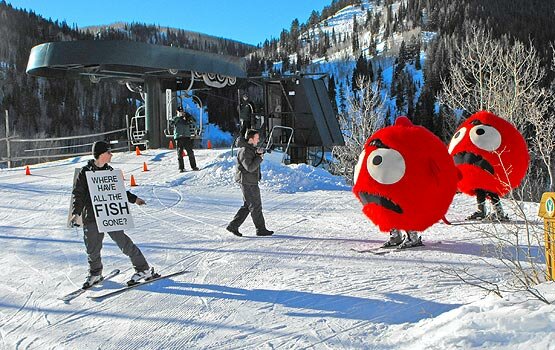
Greenpeace guppies spread their message about overfishing on the ski slopes
Seafood is a global issue and practically nowhere on our seas is beyond human reach now – the movie gives an overview of the main issues like overfishing, destructive fishing and poor management.
The movie takes a global look at the true price we’re paying for our seafood, vividly illustrating the impact we’re having, but that very few of us even realise.
Continue reading ‘Is it The End Of The Line?’

George Bush has designated 200,000 square miles of the Pacific as conservation areas in a bid to re-write his conservation reputation before he leaves office.
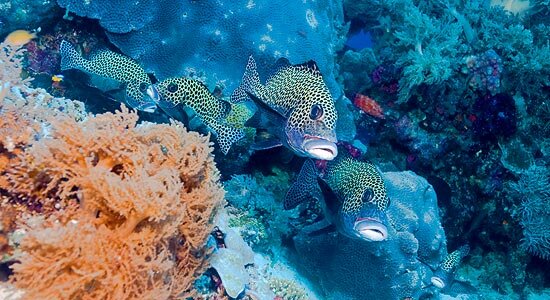
Mr Bush, who has steadfastly refused to impose statutory limits on carbon dioxide emissions to combat global warming, became the leader who has protected more of the oceans than anyone else in the world.
The areas protected, with the active intervention of the First Lady, Laura Bush, include pristine coral reefs, the habitat of vanishing marine species, and the deepest place on Earth, the Mariana Trench. Continue reading ‘George Bush designates marine reserves the size of Texas as one of last acts as president’


![]()







